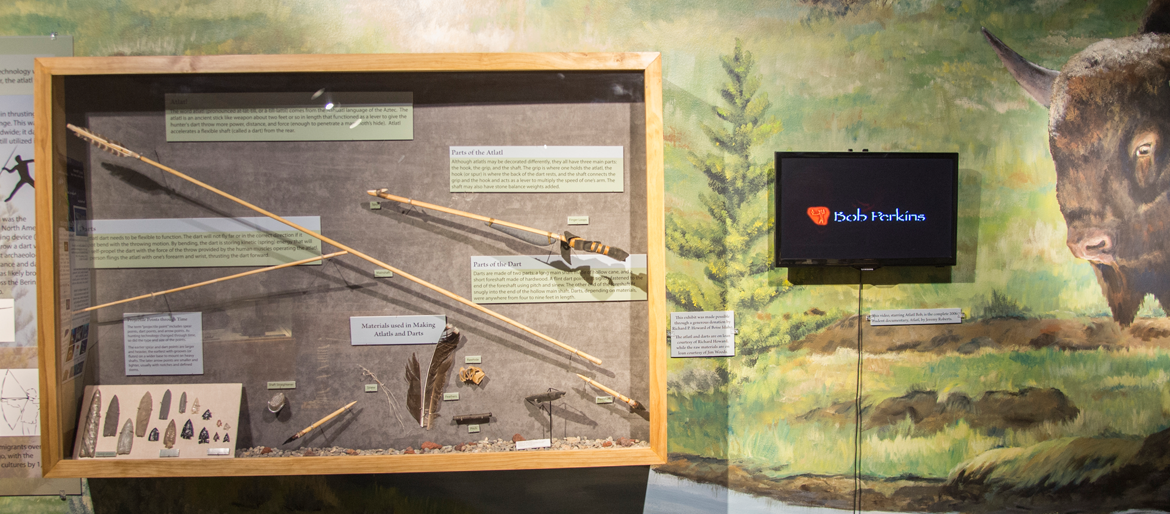Earl H. Swanson Archaeological Repository
The Earl H. Swanson Archaeological Repository (ESAR) is one of three archaeological repositories operating under the Archaeological Survey of Idaho (ASI), whose core mission is to ensure that archaeological materials recovered within the State of Idaho are curated and remain within the state for the benefit of public and scientific interests, and to guarantee their continued accessibility for study and other educational purposes. All collections are available to the public for such purposes, in accordance with the IMNH Collections Management Policy, the ESAR Curation Policies, and Procedures, and all applicable laws and regulations regarding the maintenance and use of federally and state-owned or administered collections.
ESAR houses and maintains collections and associated documentation resulting from surveys and excavations occurring on federal or state lands, or through federal/state projects, in eastern Idaho since the 1950s. While the physical inventory is still in progress, our database currently includes over 111,000 entries, representing at least 650,000 individual artifacts recovered from over 4,880 sites in eastern Idaho. Over 95% of the collection is prehistoric in nature, with <5% from the historic era. This includes a wide variety of material, such as prehistoric stone tools and implements, pottery, ornamental objects (e.g., beads, pendants), basketry, faunal remains, and organic and soil samples, as well as historic cans, bottles, tableware, clothing items,
ammunition, construction material, and machinery parts. The majority of these materials originate from federal lands, including the BLM, BOR, US Forest Service, and the Idaho National Laboratory, though ESAR does maintain collections from state and private lands as well.
ESAR specifically manages collections from 24 counties in eastern Idaho. Its counterparts are the Western Repository, managed by the Idaho State Historical Society in Boise, and the Northern Repository, managed by the Alfred W. Bower’s Laboratory for Anthropology at the University of Idaho in Moscow.
Please feel free to contact the repository for further information, or to make an appointment to access the collections:
The collections curation program for the Archaeological Survey of Idaho was developed to ensure the preservation and continued access to archaeological collections from sites within the State of Idaho. The term “collection” refers to materials recovered by archaeological surveys, tests, or excavations and all supporting documentation, including maps, field notes, records of analysis, catalogs, reports, photographic media, and site forms.
Collections are available for legitimate scientific, educational, and religious uses, subject to terms and conditions of the collection owner as well as those necessary to protect and preserve the condition, research potential, religious, or sacred importance of the collection.
ESAR has three forms that must be read, filled out, and signed before access to the collections (including documentation) will be authorized (Request for Collections Use, Statement of Confidentiality, and Collections Use Policy). In addition, resumes of the individuals requesting access and statements of purpose are required. Site file access is governed by the State Historic Preservation Officer (SHPO) and will be granted only after a Statement of Confidentiality is read and signed by each member of the requesting party. Two weeks' advance notice is required to schedule an on‑site visit. The collections manager must be contacted for visits to use a collection in order to provide time to acquire the appropriate approvals, pull the collection of interest, schedule a time when staff assistance is available, and ensure the collection is not already committed to another use. Be advised that access to archaeological collections and site forms is limited according to federal regulations. Additional forms will be required for any off‑site loan of objects or documentation. We will conduct record searches or provide photocopying services for a standardized fee.
If a collection is federally owned and research requires that the collection is temporarily removed from the custody of the Repository, an Outgoing Loan Agreement with ESAR, a letter of temporary custody transfer and approved use from the federal land‑owning agency, and a proposal with a protocol for the analysis will also be required. The authorization letter (subject to verification) must be obtained from the appropriate agency by the person/s and/or institution/s requesting the loan. Please be aware that destructive analysis is not currently addressed by federal mandates (CFRs), and may take quite some time to obtain approval. If destructive analyses are proposed, this may also require approvals from additional parties.
Collections are to be studied in areas of the repository set aside for this purpose. If necessary, a loan agreement subject to collection owner approval may be arranged for institutions and agencies for off-site use.
Costs of preparing collections for loan, including packaging, transportation, inventory, and re-shelving upon return, are the responsibility of the borrower. Collections must be returned in the same condition as they were received. Please review the ESAR Curation Policy and Procedures to ensure the collections are returned in the appropriate manner (e.g., archival quality bags, labels, etc). If the collections are not returned in the appropriate packaging, the borrower shall be billed for the time taken to bring the collection back to repository standards.
To avoid damage or reduction in their scholarly and scientific value, all materials should be handled with great care; failure to be reasonable and prudent in the use of collections will result in the loss of access to them. Insurance coverage may be required for off-site use of a collection.
It is important to note that collections on loan to a researcher are the responsibility of that researcher. If the collections are lost or damaged in any way, the borrower will be subject to penalties instated by the agency owning the collection and are responsible for any fees incurred by the Repository in resolving the matter.
Materials in use are not normally available for concurrent use by another researcher. In some cases, special arrangements may be made for on-site study of material in exhibits if the material can be returned expeditiously to the exhibit. In the case of materials already under study, the consent of both the collections manager and the individual directing the study is necessary before the materials can be examined by another individual. The repository should be contacted as additional collection owner approval may be necessary. Individuals using materials on loan are not authorized to make further loan of material to someone else.
Loans will normally be limited to a period of six months. Evidence of continued study must be forthcoming or individuals holding material on loan will be required to relinquish the materials. Such evidence can take the form of a monthly report on the progress of the study in question. If an extension of a loan period is desired, a written request must be made prior to the end of the original loan period.
When the study of materials under the care of a repository results in a publication the borrower should make proper acknowledgment to the Survey and the owner of the collection and provide two copies of the publication (for distribution to the collection owner and for the collection’s records) to the repository. Please contact the Collections Manager for the agency-specific preference for acknowledgment.
Fees
A fee of $35.00 per hour (or any portion of an hour) is assessed for on-site visits to examine or photograph collections, view photographs or other documents in the archives, and accommodate site file research requests. Document copying costs are set at $.10 per page. Costs for reproducing photographic media are based on a variety of factors and must be determined on an individual basis. Please call (208) 282‑3042 or email the Collections Manager for fee details, request copies of forms, or schedule an appointment.
The access fee may be waived for students requesting access to collections for purposes of academic research (i.e., theses or dissertations). In these situations, the advising professor must submit documentation stating that the student’s research is not funded under any form of grant or contract. If loans are requested for this purpose, the advising professor must assume responsibility for the collections. The appropriate forms for access/loan requests and authorization are still required.
Supplies and Suppliers
Conservation Materials, Ltd.
1165 Marietta Way
Sparks, Nevada 89431
(702) 311-0582
- Soluvar varnish, acid-free papers, boxes, tags, and tissue.
University Products
517 Main Street
Holyoke, Massachusetts 01040
(800) 628-1912
- Acid-free paper products and boxes. Archival supplies.
Light Impressions
PO Box 2100
Santa Fe Springs, California 90670
(800) 828-6216
- Archival & photography supplies
The Hollinger Corporation
9401 Northeast Drive
Fredericksburg, Virginia 22408
(800) 634-0491
- Acid-free boxes
Plastics and Foams
Ethafoam or polyethylene foam. (Note: Do not purchase foam that has been treated with a fire-retardant. The foam should be white, not pink).
Katzke Paper Co.
2495 S. Delaware Street
Denver, Colorado 80223
(800) 742-3546
Industrial Rubber
(Rep.: Roger Hansen)
P.O. Box 2276
Tacoma, Washington 98401-2276
(206) 272-3244; (253) 922-5339 FAX
Voltec
100 Shepard St.
Lawrence, Massachusetts 01843
(617) 685-2557
Dow Chemical, Inc.
1703 S. Saginaw Rd.
Midland, Michigan 48640
(800) 258-2580
Gem State Paper and Supply
334 S. 1st Ave.
Pocatello, Idaho
(208) 232-6966
- Polyethylene zip-lock bags. (They stock sizes up to12″x 12″, larger sizes must be special ordered).
Managing Archeological Collections by the National Park Service
Intermountain Antiquities Computer System (IMACS) Guide
Department of Anthropology, ISU
Center for Archaeology, Materials and Applied Spectroscopy (CAMAS)
Idaho State Historical Society
Alfred W. Bowers Laboratory of Anthropology (Archaeological Survey of Idaho Northern Repository)
Archaeology and the Law
Federal:
Federal Historic Preservation Laws, Regulations, and Orders
National Park Service: Laws, Executive Orders & Regulations
American Antiquities Act of 1906 as amended (16 USC 431-433)
Archeological and Historic Preservation Act of 1974 as amended (16 USC 469-469c-2)
Archaeological Resources Protection Act of 1979, as amended (16 USC 470aa-mm)
Curation of Federally-Owned and Administered Archeological Collections (36 CFR 79)
Preservation of American Antiquities (43 CFR 3)
Protection of Archeological Resources (43 CFR 7)
National Environmental Policy Act of 1969 as amended (42 USC 4321, and 4331 – 4335)
National Historic Preservation Act of 1966, as amended (16 USC 470 et seq.)
National Historic Landmarks Program (36 CFR 65)
National Register of Historic Places (36 CFR 60)
Determinations of Eligibility for Inclusion in the National Register (36 CFR 63)
Paleontological Resources Preservation
State of Idaho:
Title 67 Chapter 46: Preservation of Historic Sites
Title 27 Chapter 5: Protection of Graves
Title 33 Chapter 39: Idaho Archaeological Survey
Title 33 Chapter 39: State Historical Society
Title 33 Chapter 30: Vertebrate Paleontological Sites and Resources

Dr. Charles “Andy” Speer
Curator of Anthropology, Associate Professor
Office: Graveley Hall 162 921 S 8th Ave Stop 8005 Pocatello, ID 83209

Dr. Amy Commendador
Head of Collections and Registration, ESAR & Earth Sciences Division Collections Manager
Office: Museum Building 129 921 S 8th Ave Stop 8096 Pocatello, ID 83209

